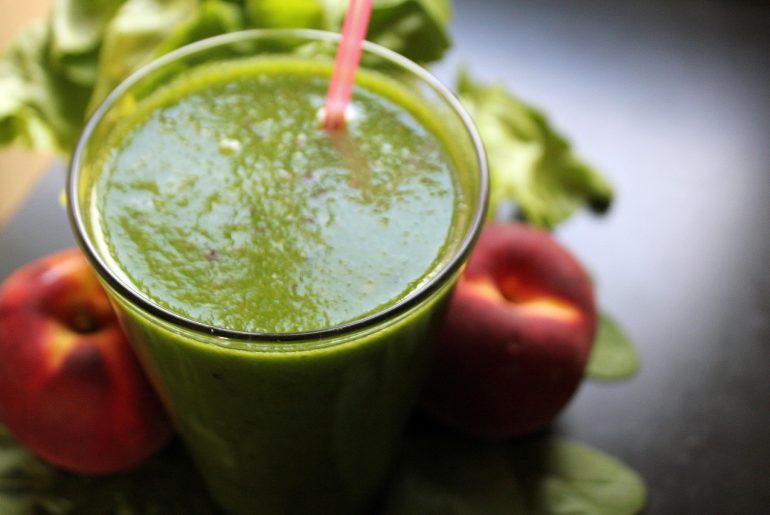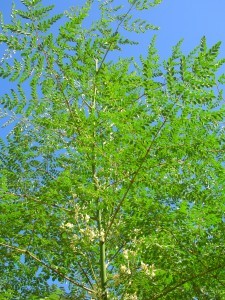Moringa oleifera also known as the the drumstick tree or horseradish tree originated in India but can also be found in Africa, Sri Lanka, Malaysia, West Indies and the Philippine Islands. Moringa has many powerful health-enhancing benefits and has been used for hundreds of years in Ayurveda medicine. Recent scientific research has proven that the leaves are in fact a powerhouse of nutritional value.
Here are some of the health benefits of Moringa:
Lower Blood Pressure and Cholesterol
Moringa oleifera plants can help keep your blood pressure and cholesterol levels down. According to the 2007 article in the “Phytotherapy Research,” Moringa leaf extracts have been shown to exert a stabilizing effect on blood pressure. Moringa leaves contain substances, such as thiocarbamate glycosides, nitrile and mustard oil glycosides, that help lower blood pressure. The same study reports that B-sitosterol, a bioactive phytoconstituent found in Moringa leaves, may help maintain healthy cholesterol levels. Furthermore, Moringa fruit has been found to reduce low-density lipoprotein, triglycerides and cholesterol in rabbits with abnormally high cholesterol levels.
Provide Protection to Liver
Eating a healthy diet helps your liver to perform all of its functions well. In contrast, a high-fat diet can cause fat to build up in your liver tissue, leading to multiple health problems. Moringa plants can help reverse the liver damage done by unhealthy foods. A study published in the June 2012 issue of “Indian Journal of Experimental Biology” found that Moringa oleifera leaf extract protected against liver damage in mice fed with a high-fat diet. Furthermore, Moringa oleifera flower extracts were found to have liver-protecting activities, notes the 2007 review published in “Phytotherapy Research.” The presence of a quercetin, a flavonoid, may be behind these beneficial effects, researchers say.
Other Medicinal Uses and Benefits
- May be beneficial for all types of arthritis
- Beneficial for diabetics because it balances blood sugars
- Stimulates metabolism
- Detoxifying – removes toxins from the blood
- Improves kidney function
- Leaves rubbed against the temple can relieve headaches.
- To stop bleeding from a shallow cut, apply a poultice of fresh leaves.
- There is an anti-bacterial and anti-inflammatory effect when applied to wounds or insect bites.
- Extracts can be used against bacterial or fungal skin complaints.
- Leaf tea treats gastric ulcers and diarrhea.
- Eating Moringa food products is good for those suffering from malnutrition due to the high protein and fibre content.
- Leaves treat fevers, bronchitis, eye and ear infections, inflammation of the mucus membrane
- The iron content of the leaves is high, and they are reportedly prescribed for anemia in the Philippines.
- Dried Moringa leaves treat diarrhea in Malawi, Africa.
- The powder ground from the seeds is also used in the treatment of scurvy skin diseases (common bacterial infections of the skin).
- Promotes healthy hair growth
- Reduces wrinkles, packed full of anti-aging ingredients for the skin
Every part of the plant has a use:
Leaves
The leaves of the Moringa tree contain vitamins A and C, potassium, iron, calcium and protein. Because of their vast nutritional value, even a small number of leaves can save a life. The leaves can be cooked or made into a powder and sprinkled on food. Other known uses for the leaves include treatment of diarrhea and crushing them for use as a cleaning agent.
Seeds
The crushed seeds of the Moringa tree can remove harmful bacteria from water through a simple filtering process, making the water suitable for drinking. The seeds also produce an oil that is used in cooking and to make fertilizer, fuel, soap, moisturizer and perfume.
Pods
Moringa pods are commonly used in Indian curries and pickles. Nearly as nutritious as the leaves, they too are effective in the fight against malnutrition. The pods also treat liver and spleen problems and joint pain.
Flowers
The delicate white Moringa flower is pretty, but its value goes beyond decoration. The juice of the flower is consumed by breastfeeding mothers to improve the quality of breast milk, and it is helpful in the treatment of urinary problems, because it encourages urination. The flower is also boiled in water to make a tea, which is used as a cold remedy.
NEXT: VIDEO: Benefits of Moringa Oleifera As Seen On The Dr. OZ Show!





1 Comment
Brent Taylor here’s a good article